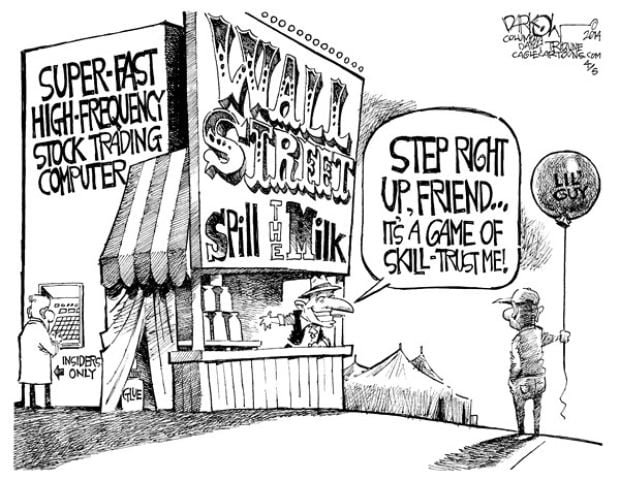
G'day All,
Well, it's been a while between drinks, oops, blog posts, but time to start collecting some thoughts again.
Old news now, but I did want to put some thoughts down about flash boys.
First of all, I do not want to recommend the book. I would hate to encourage anyone to buy the book as I don't think it is meaningful enough to advance the debate around best market practice and the role of HFT.
Sure, there are parts of it that are a good read but I do think it is a wasted opportunity to have added some real perspective to the debate.
For me there are 2 stories going on in the book. One about market access and low latency and then another story about enforcing proprietary rights, sometimes over open source code. I feel throughout the book Lewis fails to take the time to distill and demark the issues he is trying to address. E.g. Software and Hardware are often bundled together. It just leaves me feeling this book was rushed to press prematurely.
Lets set aside the sad story of Sergey Aleynikov. That leaves a tale of HFT.
The story of building Spread Networks line from Chicago to New Jersey is nice, but nothing new. To me it is no different to a toll road. We all use them. We know we have the option not to, but sometimes, lets say time is money. But again, is this so different from having a line of sight from the old trading booth onto the pit floor?
By the middle of the book we start to get into the detail of order handling and order types...and it is here that Lewis, in my view, fails to go deep enough or to clarify the issues he is trying to address.
For example...what is front running? Lewis implies all HFTs, by virtue of having access to technical infrastructure, front run the market.
"In common usage there are at least two meanings to the term. One common meaning is as shorthand for "front-running demand," which is what happens when someone tries to figure out whether your mutual fund or your pension fund is buying or selling stock, realizes that it will change supply-and-demand dynamics for the stock, affecting the price, and front-runs that demand to profit.
Imagine if someone made a reasonable guess you needed milk, raced ahead of you to the only store in town to buy up all the milk before you got there, and then offered to sell you milk at a higher price than the store sold it to him; this is one example of front-running demand, just as described in "Flash Boys." (It's also called "trading ahead.") Another common meaning is "front-running a customer order," a type of insider trading, where a stock broker believes his own customer's order will change supply-and-demand and tries to profit from that"
By In the markets - Published on Amazon.com
The next bit that I thought could have been just as useful was a deeper exploration into order types. Again, we just get a scratching of the surface with a bit of fear mongering thrown in. Hardly advances the cause.
I did however find this run down of order types more useful:
https://www.kcg.com/uploads/documents/KCG_Demystifying-Order-Types_092414.pdf
I am often amazed at the quality of analysis done by the people at Nanex.
This paper specifically investigates exploratory trading that attempts to determine whether the bid/ask spread is about to shift up or down a level.
http://www.nanex.net/aqck2/4136.html
The last part of the book is just a slavish devoted sales pitch for the IEX exchange and their business model. Looks like Mr Lewis took the bait: hook, line and sinker.
Their story here:
http://www.iextrading.com/
So, my takeaway is that regulatory scrutiny around equity execution is not going to fade away. I think it will remain front and center for the coming years and the regulatory lasso will probably tighten under the guise of harsher interpretation of 'best execution'.
TR14/13 - Best execution and payment for order flow.
https://www.fca.org.uk/news/tr14-13-best-execution-and-payment-for-order-flow
Right, enough of a Flash Boys rant.
A few other snippets below. More to follow.
In terms of logisitics, I will post this blog (obviously) at:
www.clearingandsettlement.blogspot.com
I will also post it on the LinkedIn Group CCP Clearing Houses.
https://www.linkedin.com/grp/home?gid=2026241
I will also try and "push" this out via my contacts list.
If you would like to be included...please just ping me a note.
If you'd like to be excluded...sorry for the spam and please just ping me a note.
...and for bit of fun, I recently did this (Fat Boy Slim and Zoe Ball observed)..
A spot of charity fun on the 'beach' (?)...the Brighton Big Balls run.
http://www.brightonbigballs.com/
Whatever your pleasure...have a great week-end.
Scott.
www.clearingandsettlement.blogspot.com
Policy
EFAMA has today published a response to the second FSB/IOSCO consultation on the assessment methodologies for identifying non-bank, non-insurer (NBNI) globally systemically important financial institutions (G-SIFIs).
http://www.efama.org/Pages/EFAMA-argues-against-the-perceived-systemic-nature-of-the-asset-management-industry--.aspx
*** I'm not so comfortable with extending the net over Asset Managers.
Building a Capital Markets Union.
http://ec.europa.eu/finance/consultations/2015/capital-markets-union/docs/green-paper_en.pdf
http://www.thecityuk.com/research/our-work/reports-list/eu-reform-a-view-from-thecityuk/
Stuff.
I did used to like Scott Adams and Dilbert very much. Now I think some of the material is not so fresh. That said, he does still hit the nail on the head. I notice he has also started blogging. I enjoyed this post:
In terms of my practical application I see knowledge and learning as a system, not a goal. We all travel various paths in our careers. It is how you transfer your skills and knowledge across disciplines and how we learn to communicate in the right context with other practitioners that is part of the fun of the journey.
The opposite of talking isn't listening.
The opposite of talking is waiting.
- Fran Lebowitz.
No comments:
Post a Comment